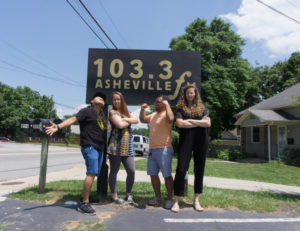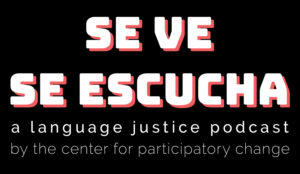Se Ve Se Escucha (Seen and Heard) is a podcast by the Center for Participatory Change about language justice and what it means to be an interpreter, an organizer and bilingual in the US South. Language justice is about interpretation and translation, but it’s also about building meaningful relationships to organize and transform our communities. Join Ada and special guests from the US and global South, as they discuss what it means to be seen and heard.

SEASON 2
Episode 13: Candela te voy a dar
We close out the second season of Se Ve Se Escucha with three Boricuas using language justice to create bridges between folks in the diaspora and folks in Puerto Rico! Cristóbal Guerra Naranjo is an interdisciplinary artist and language worker from Borikén. Their work combines experimental video, documentary film, visual art and text to explore ideas of “home”, el Caribe, queerness and belonging. Patri González Ramírez is also an artist and language worker born and raised in Borikén. They create media for self-healing and support the growth of multilingual competency in community organizing and social movements through interpretation. Pao Lebrón Guzmán is a diasporic BoriCuir, food grower/maker and cultural organizer pursuing a path to decolonization by recovering and creating new language, preserving food and seeds, and making medicine and through earth stewardship. Pao uses language as a tool for organizing and for remembering inter-generational knowledge. Together, Cristóbal, Patri and Pao constitue Colectivo Babilla, a collective of Queer/Cuir transfeminist anti-racist language workers who come from experiences of migration and the diaspora. Recorded in Brooklyn and Borikén!
Episode 12: No somos uno
Curious about interpreter coops, crews and collectives? Three guests doing collective language justice work in the South join us on this special episode. Tony Macias is a founding worker-owner of tilde Language Justice Cooperative and has worked nationally and internationally to bring language skills to movements and a justice-oriented approach to multilingual spaces. Rocio Quintero is one of ten worker-owners who are weaving community through language at Cenzontle Language Justice Coop. José Eduardo Sánchez is a member of Antena Houston, a collective of interpreters, translators, and language justice workers dedicated to creating inclusive multilingual capacity and spaces across Houston. Our three guests get into the nitty gritty of coops and collectives, including rates, equitable distribution of work, and the hardest and most rewarding parts of doing language justice work with others.
Episode 11: What you gonna do to make the people rise?
Recorded at CPC’s annual Language Justice Interpreter Training! In this episode, we hear from high school students, interpreters of all experience levels, community activists and others who find themselves having to interpret in their daily lives. At the two-day workshop, these folks learned about consecutive and simultaneous interpretation, tips and exercises to improve interpreting techniques, and interpreter role and ethics. They also reflected on how their experiences and identities play a part in interpreting. Gracias a Nikki, Stephanie, Jeanette, Stacy, Priscila, Cynthia, Paula, Estefany, Giovanni, and Natalia for joining us on the podcast, and thanks to everyone who participated in the training! To find out more visit www.cpcwnc.org .
Episode 10: ¿Qué queremos? ¡Justicia?
Se Ve Se Escucha is proud to welcome @queerterpreter, Ártemis López. Ártemis is an ATA-certified Spanish<>English translator and CCHI-certified medical interpreter based in Washington, D.C. They hold a master’s degree in Medical Translation from the Universitat Jaume I in Spain, and have been translating and interpreting for the queer, trans, and non-binary communities in D.C. and the world since 2011. They primarily research non-binary Spanish and how people across the world use language to their advantage rather than let themselves be governed by language. Ártemis and Ada get into queer-terpreting, trans-lation, the difference between Direct and Indirect Non-binary language and…One Day at a Time!
Episode 9: Up up with liberation
This one’s for the teachers and all the non-binary folks! Se Ve Se Escucha welcomes Maestre Lourdes Rivas, author of “They Call Me Mix / Me llaman Maestre”, to the podcast. Lourdes is a queer, Xicanx, non-binary educator, currently teaching kindergarten at a Spanish immersion public school in the San Francisco Bay Area. They recently published their first children’s book, entitled “They Call Me Mix / Me Llaman Maestre”, out of a dire necessity to have in existence something they could use in the classroom to expand kids’ notions around gender. Join Ada and Lourdes as they talk about the inspiration behind the book and discussing gender with kids. Get your copy of “They Call Me Mix” at www.squareup.com/store/theycallmemix/
Episode 8: We are the ones
It’s here everybody! A brand new season of Se Ve Se Escucha! We kick off Season 2 with Cantrice Janelle Penn, founder of Queer Black Editing. QBE offers a holistic, increasingly anti-colonial approach to copyediting through a framework of lived experience and language. Cantrice is a copyeditor, writer, and semi-aromatherapist. Queer Black Editing was birthed out of Cantrice’s lifelong love of language, and frustration with how the english language harms and erases marginalized folx and communities in larger society. Queer Black Editing is about setting your writing (and getting) free. It’s copyediting with a language justice lens! Follow Cantrice at @queer.black.editing .
SEASON 1
Episode 7: El pueblo está en la lucha
We close out Season One with your listener letters! And who better to answer them with than our friend and mentor Roberto Tijerina?! Together, we’ll answer your questions about breaking out of the Spanish-English dichotomy, self-care for interpreters, and the future of the language justice movement. Stay connected with SVSE via Facebook, Instagram, and Twitter to find out more about CPC’s upcoming work and stay tuned for Season Two!
Episode 6: De sur a norte
* This multilingual episode in available with interpretation into English, with interpretation into Spanish, and the original Spanish and Hñähñu
Abel González, Eulogio Martínez, and Thubini Mästo̱ho̱ join Andrea and Ada to share their experiences as Hñähñu (Otomi) speakers working on language preservation. Abel and Eulogio are the cofounders of Ra rojo ra Hñähñu, a multigenerational Hnähñu class in Asheville, NC. Thubini lives in Mexico and teaches Hñähñu and Tù’ùn Savi (Mixteco) online through his project Mastoho Lenguas Originarias. Join us for this very special multilingual conversation about language revitalization, decolonization, and migration.
Episode 5: We have come this far
On this episode of SVSE, we talk interpretation, racial equity and anti-blackness. How can we expand the language justice movement to reflect the reality of folks who don’t have access to the languages spoken by their ancestors? CPC’s Racial Equity Circle Co-Coordinator, Tamiko Ambrose Murray, joins us to talk about her family history and her personal journey with language justice.
Episode 4: Lxs niñxs unidxs
Juan Diaz and Erica Johnson join Ada and Andrea to talk about popular education and Seeds of Hope, CPC’s multilingual youth program. How can we create movement spaces that make young people excited about social justice and proud of speaking other languages? We’re also joined by special guests from RAICES, a local summer camp, who will tell us what it’s like to grow up bilingual in North Carolina.
Episode 3: We’re here, we’re cuir
This week, Andrea and Ada talk to fellow chingonas Catalina Nieto and Cecilia Saenz Becerra. Catalina and Ceci are both experienced interpreters, language justice trainers and queer #sexyterps!! What does queering language even mean, and what has it meant for our guests? This week’s episode explores reclaiming and changing language. Plus, we’ll discuss some of our favorite LGBTQ vocab to interpret!
Episode 2: Se ve, se siente
Being bilingual does not an interpreter make. Join Ada, Andrea and Monse Ramirez, SONG’s bilingual regional organizer and CPC’s former Tzedek Language Justice fellow, as they talk about training interpreters and becoming social justice terps.
Episode 1: Aquí estamos
Meet the team behind Se Ve Se Escucha. Hear Ada, Andrea, Leonel and Manuel discuss their experience with language and share their thoughts about living in North Carolina, language justice and the work of the Center for Participatory Change.
